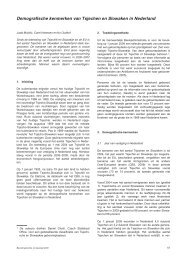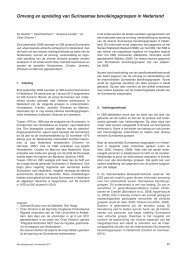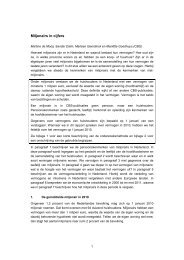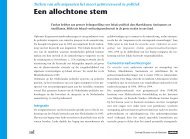Babyboomers in the Netherlands: What the statistics say - Cbs
Babyboomers in the Netherlands: What the statistics say - Cbs
Babyboomers in the Netherlands: What the statistics say - Cbs
Create successful ePaper yourself
Turn your PDF publications into a flip-book with our unique Google optimized e-Paper software.
Hedonistic youth<br />
4<br />
In <strong>the</strong> 1960s, Dutch youths took over <strong>the</strong> public space<br />
with <strong>the</strong>ir mopeds and loud rock and roll music. The<br />
Ne<strong>the</strong>rlands experienced its own ‘beatnik’ subcultures<br />
– <strong>the</strong> nozems and <strong>the</strong> provos – but also<br />
happen<strong>in</strong>gs and student riots. In 1967, <strong>the</strong> Ne<strong>the</strong>rlands<br />
Foundation for Statistics conducted a survey among<br />
<strong>the</strong> age group 16–23 years. It revealed that <strong>the</strong>se<br />
youngsters had a fair amount of money, and that <strong>the</strong>y<br />
wanted to spend it. One surpris<strong>in</strong>g detail from <strong>the</strong><br />
survey: two out of three people <strong>in</strong> this age group<br />
shopped for clo<strong>the</strong>s with <strong>the</strong>ir mo<strong>the</strong>rs.<br />
Identity<br />
The baby boom generation was formed by a completely<br />
different environment than <strong>the</strong>ir parents. This new<br />
generation did not have to struggle to survive, and<br />
– accord<strong>in</strong>g to prom<strong>in</strong>ent historians – were not<br />
bo<strong>the</strong>red by <strong>the</strong> what <strong>the</strong>y called <strong>the</strong> ‘puritan’ and<br />
‘ascetic’ attitudes to life of <strong>the</strong> pre-war generation,<br />
whose characters had been formed <strong>in</strong> <strong>the</strong> crisis of <strong>the</strong><br />
1930s and <strong>the</strong> subsequent war. They had seen or<br />
experienced large scale poverty and unemployment.<br />
Accord<strong>in</strong>g to historian Hans Righart, references to<br />
<strong>the</strong>se experiences only served to ‘polarise and estrange’<br />
<strong>the</strong> new generation of youths. He called <strong>the</strong> youth<br />
culture by contrast ‘downright hedonistic’: children<br />
born after <strong>the</strong> war grew up <strong>in</strong> years of <strong>in</strong>creas<strong>in</strong>g<br />
affluence, technological change and new means of<br />
communication, which gave <strong>the</strong>m a new identity.<br />
One billion euro to spend<br />
Accord<strong>in</strong>g to <strong>the</strong> Ne<strong>the</strong>rlands Foundation for Statistics,<br />
too, <strong>the</strong> youth culture of <strong>the</strong> 1960s was characterised<br />
hedonism and consumerism. In 1967 <strong>the</strong> foundation<br />
conducted a survey of how young people spent <strong>the</strong>ir<br />
money, what <strong>the</strong>y read and what <strong>the</strong>y did <strong>in</strong> <strong>the</strong>ir spare<br />
time. The study was based on <strong>in</strong>terviews with a group<br />
of unmarried young men and women aged 16–23 years.<br />
The ma<strong>in</strong> conclusion of <strong>the</strong> study was that <strong>the</strong>se<br />
youngsters had a lot of money to spend and that <strong>the</strong>y were<br />
will<strong>in</strong>g to spend it. The researchers reported that <strong>the</strong><br />
young generation were a consumer factor to be reckoned<br />
with and an appeal<strong>in</strong>g target group for marketers. The<br />
study estimated that toge<strong>the</strong>r, <strong>the</strong>se young people had<br />
more than 2.1 billion guilders (0.95 billion euro) to spend.<br />
Kikkers and buls<br />
The most coveted possession of this age group was a<br />
moped: it was at <strong>the</strong> top of <strong>the</strong> wish lists of both<br />
boys and girls. Mopeds were <strong>the</strong> most democratised
















